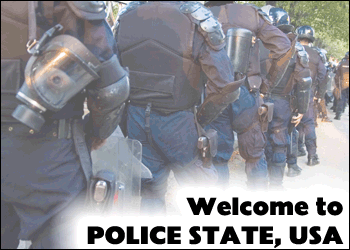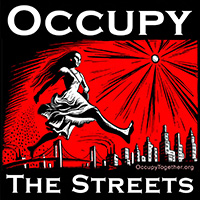As protests spring up in cities across the country, authorities are thinking up creative ways to contain this peaceful uprising.
Rania Khalek
AlterNet
As Occupy Wall Street protests spring up in cities across the country, authorities are thinking up creative ways to contain this peaceful and inspiring uprising. Although laws and municipal ordinances vary from city to city, there is a consistency in the tactics being used to stifle the movement. More importantly, as demonstrated by the protesters at Zuccotti Park who kept strong in the face of a looming eviction that never came to fruition, these maneuvers are not working.
Still, there is no shortage of justifications and rationales behind the constantly evolving schemes being implemented to destroy the spirit of Occupy Wall Street. Here are 12 desperate and unsuccessful measures the authorities are using to discourage, deter and crack down on peaceful protests.
1) No Snoozing In Public
 |
| Ad |
Most cities have an anti-camping ordinance on the books that prohibits camping or sleeping in public spaces, particularly public parks, to minimize the risk of nighttime criminal activity. But the ordinances are frequently used to cleanse cities of the inconvenient and uncomfortable scenery of
homeless people; police in San Francisco are known for enforcing the city’s camping ordinance primarily against the homeless.
But now, all over the country, anti-camping ordinances are being used to arrest and deter protesters from occupying public spaces.
Local news stations covering Occupy Dallas
report that police plan to begin enforcing the city’s ordinance against sleeping in public, first with warnings, then tickets, and eventually arrest. Due to a city ordinance that prohibits sleeping in Los Angeles public parks, Occupy LA activists
move their tents to the sidewalk every night, and move them back to the park every morning. Occupy Chicago protesters have resorted to
staying awake in shifts, then switching with one another to sleep in cars or someone’s home nearby to get around the ban against sleeping on the public sidewalk.
2) No Umbrellas
Officials in various cities are citing ordinances that prohibit the erection of permanent or semi-permanent structures, referring to tents, tarps, sleeping bags, and in one city, umbrellas.
According to Seattle’s newsweekly,
The Stranger, the Seattle Police Department warned protesters that, “You can’t have an umbrella open unless you’re standing and holding it,” otherwise they are considered structures and will be confiscated. Seattle Mayor Mike McGinn later clarified the reasoning in a statement, saying, “As for umbrellas, police were concerned that protest participants were using umbrellas and tarps to create makeshift tents to evade the no-camping rule.”
In a city known for its heavy rains, it’s rather extreme to ban the use of umbrellas. But the absence of tents, tarps and even umbrellas during downpours in New York City and Washington DC has yet to discourage protesters.
3) Curfews
Fortunately for the Occupy Wall Street protesters in NYC, the privately owned Zuccotti Park is
open 24 hours a day, unlike city-owned parks that are usually closed in the late night to early morning hours. In city and state-owned parks occupied by protesters throughout the country, authorities are using park curfews to their advantage. Just after 3am on the morning of Friday, Oct. 14, Denver police raided the Occupy Denver encampment citing an 11pm to 5am curfew at state parks, making at least
21 arrests. A similar 11pm curfew in Iowa led to
32 arrests on Oct. 9. The same thing happened at
Occupy Sacramento.
var linkwithin_site_id = 557381;
linkwithin_text=’Related Articles:’




Be the first to comment on "12 Most Absurd Laws Used to Stifle the Occupy Wall St. Movement Around the Country"